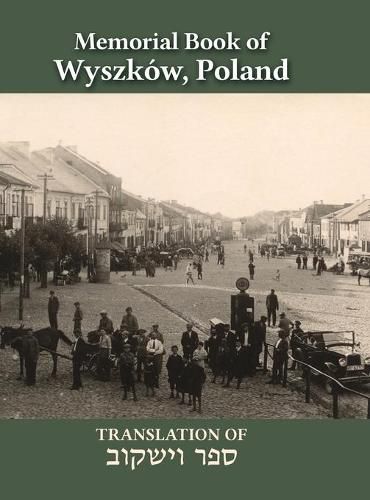Readings Newsletter
Become a Readings Member to make your shopping experience even easier.
Sign in or sign up for free!
You’re not far away from qualifying for FREE standard shipping within Australia
You’ve qualified for FREE standard shipping within Australia
The cart is loading…






This title is printed to order. This book may have been self-published. If so, we cannot guarantee the quality of the content. In the main most books will have gone through the editing process however some may not. We therefore suggest that you be aware of this before ordering this book. If in doubt check either the author or publisher’s details as we are unable to accept any returns unless they are faulty. Please contact us if you have any questions.
This is the translation of the Memorial or Yizkor Book of the Jewish Community of Wyszkow, Poland.
The town of Wyszko w, about 35 miles northeast of Warsaw, lies along the Bug River. Jewish people started to inhabit the town in the late 1700s and were en- gaged as merchants and craftsmen. In the 19th and 20th centuries, they began to engage with small trade. Before World War I, Jews owned various businesses such soda water factories, ice cream parlors, and a railway carriage production factory. Also, they were involved in processing forest products and established wood tar factories.
In the 19th century, the Hassidim began to play a greater role in the community and dominated it in the second half of the 19th century. The establishment of Yeshiva Beis Yosef in 1908 was an example of the influences of orthodox socie- ty.
After the town was invaded and occupied by the Germans in September 1939, the town commandant evicted all the Jews. Nearly 80 Jews and eight Poles were forced into a barn which was then set on fire. Everyone perished. During the first days of the occupation, the Germans rounded-up and killed approximately 1,000 Jews. As the war ensued, others were sent to death camps. Some Jew- ish residents of Wyszko w managed to escape. Some reached Polish territory which had been occupied by the Russians. Those who managed to survive relo- cated to many countries around the globe, mostly the United States of America and the State of Israel.
This Yizkor Book serves as a memorial to all the victims of the Shoah from Wyszko w and nearby towns.
$9.00 standard shipping within Australia
FREE standard shipping within Australia for orders over $100.00
Express & International shipping calculated at checkout
Stock availability can be subject to change without notice. We recommend calling the shop or contacting our online team to check availability of low stock items. Please see our Shopping Online page for more details.
This title is printed to order. This book may have been self-published. If so, we cannot guarantee the quality of the content. In the main most books will have gone through the editing process however some may not. We therefore suggest that you be aware of this before ordering this book. If in doubt check either the author or publisher’s details as we are unable to accept any returns unless they are faulty. Please contact us if you have any questions.
This is the translation of the Memorial or Yizkor Book of the Jewish Community of Wyszkow, Poland.
The town of Wyszko w, about 35 miles northeast of Warsaw, lies along the Bug River. Jewish people started to inhabit the town in the late 1700s and were en- gaged as merchants and craftsmen. In the 19th and 20th centuries, they began to engage with small trade. Before World War I, Jews owned various businesses such soda water factories, ice cream parlors, and a railway carriage production factory. Also, they were involved in processing forest products and established wood tar factories.
In the 19th century, the Hassidim began to play a greater role in the community and dominated it in the second half of the 19th century. The establishment of Yeshiva Beis Yosef in 1908 was an example of the influences of orthodox socie- ty.
After the town was invaded and occupied by the Germans in September 1939, the town commandant evicted all the Jews. Nearly 80 Jews and eight Poles were forced into a barn which was then set on fire. Everyone perished. During the first days of the occupation, the Germans rounded-up and killed approximately 1,000 Jews. As the war ensued, others were sent to death camps. Some Jew- ish residents of Wyszko w managed to escape. Some reached Polish territory which had been occupied by the Russians. Those who managed to survive relo- cated to many countries around the globe, mostly the United States of America and the State of Israel.
This Yizkor Book serves as a memorial to all the victims of the Shoah from Wyszko w and nearby towns.